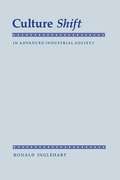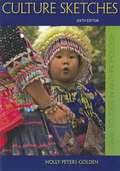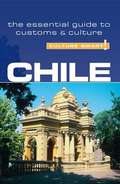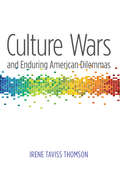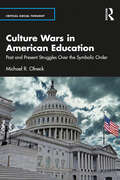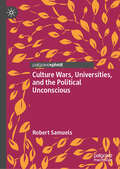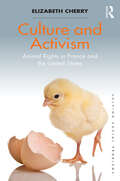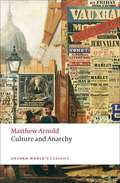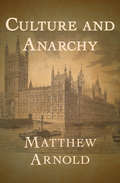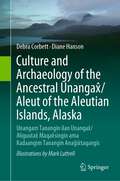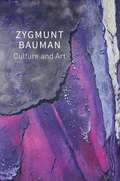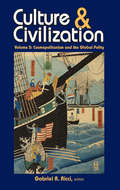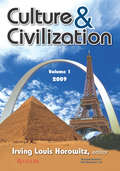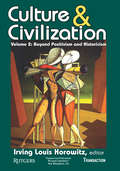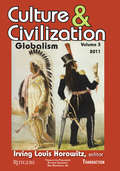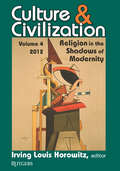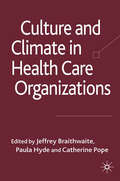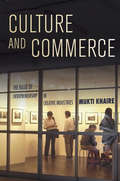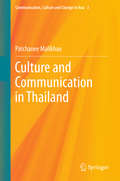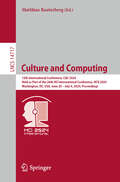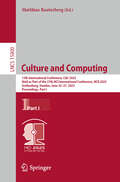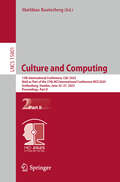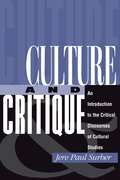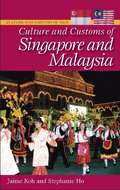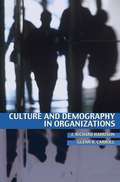- Table View
- List View
Culture Shift In Advanced Industrial Society
by Ronald InglehartEconomic, technological, and sociopolitical changes have been transforming the cultures of advanced industrial societies in profoundly important ways during the past few decades. This ambitious work examines changes in religious beliefs, in motives for work, in the issues that give rise to political conflict, in the importance people attach to having children and families, and in attitudes toward divorce, abortion, and homosexuality. <p><p>Ronald Inglehart's earlier book, The Silent Revolution (Princeton, 1977), broke new ground by discovering a major intergenerational shift in the values of the populations of advanced industrial societies. This new volume demonstrates that this value shift is part of a much broader process of cultural change that is gradually transforming political, economic, and social life in these societies. <p><p> Inglehart uses a massive body of time-series survey data from twenty-six nations, gathered from 1970 through 1988, to analyze the cultural changes that are occurring as younger generations gradually replace older ones in the adult population. These changes have far-reaching political implications, and they seem to be transforming the economic growth rates of societies and the kind of economic development that is pursued.
Culture Sketches: Case Studies in Anthropology
by Holly Peters-GoldenIdeal for any cultural anthropology course, this brief collection of ethnographic case studies exposes students to 15 different cultures. The groups selected are peoples whose traditional cultures are uniquely their own. Each has distinctive patterns and practices; each has faced the challenge of an encroaching world, with differing results. Moreover, they often provide the prime illustrations of important concepts in introductory anthropology course including Azande witchcraft, Ju/'hoansi egalitarianism, Trobriand kula exchange, and Minangkabau matriliny. As such, this volume can stand alone as an introduction to central ethnographic concepts through these 15 societies, or serve as a valuable companion to anthropology texts. Many of the peoples presented are involved in the diaspora; some struggle to preserve old ways in new places. All sketches follow a logical, consistent organization that makes it easy for students to understand major themes such as history, subsistence, sociopolitical organization, belief systems, marriage, kinship, and contemporary issues.
Culture Smart! Chile
by Caterina PerroneAfter an initial description of its varied and dramatic geography, Culture Smart! Chile focuses on the people, whose ancestors include warlike Indians, ambitious conquistadors, and desperate migrants. It describes the core values of Chilean society, in particular the key roles of family, class, and solidarity. It discusses how Chileans relate to each other and establish friendships, explores their attitude toward foreigners, and provides useful tips to help you make the best of your stay. For those visiting on business, there are vital insights into business practices and negotiating style. Finally, it reveals two striking aspects of Chilean culture: the pleasures of Chilean food and the daunting originality of Chilean Spanish. Culture Smart! Chile will introduce you to the often surprising charms of a multifaceted and fascinating society.
Culture Wars and Enduring American Dilemmas
by Irene Taviss Thomson"Irene Taviss Thomson gives us a nuanced portrait of American social politics that helps explain both why we are drawn to the idea of a 'culture war' and why that misrepresents what is actually going on. " ---Rhys H. Williams, Professor and Chair, Department of Sociology, Loyola University Chicago "An important work showing---beneath surface conflict---a deep consensus on a number of ideals by social elites. " ---John H. Evans, Department of Sociology, University of California, San Diego The idea of a culture war, or wars, has existed in America since the 1960s---an underlying ideological schism in our country that is responsible for the polarizing debates on everything from the separation of church and state, to abortion, to gay marriage, to affirmative action. Irene Taviss Thomson explores this notion by analyzing hundreds of articles addressing hot-button issues over two decades from four magazines:National Review,Time,The New Republic, andThe Nation, as well as a wide array of other writings and statements from a substantial number of public intellectuals. What Thomson finds might surprise you: based on her research, there is no single cultural divide or cultural source that can account for the positions that have been adopted. While issues such as religion, homosexuality, sexual conduct, and abortion have figured prominently in public discussion, in fact there is no single thread that unifies responses to each of these cultural dilemmas for any of the writers. Irene Taviss Thomson is Professor Emeritus of Sociology, having taught in the Department of Social Sciences and History at Fairleigh Dickinson University for more than 30 years. Previously, she taught in the Department of Sociology at Harvard University.
Culture Wars in American Education: Past and Present Struggles Over the Symbolic Order (Critical Social Thought)
by Michael R. OlneckCulture Wars in American Education: Past and Present Struggles Over the Symbolic Order radically questions norms and values held within US Education and analyses why and how culture wars in American education are intense, consequential, and recurrent.Applying the concept of “symbolic order,” this volume elaborates ways in which symbolic representations are used to draw boundaries, allocate status, and legitimate the exercise of authority and power within American schooling. In particular, the book illustrates the “terms of inclusion” by which full membership in the national community is defined, limited, and contested. It suggests that repetitive patterns in the symbolic order, for example, the persistence of the representation of an individualistic basis of American society and polity, constrain the reach of progressive change. The book examines the World War I era Americanization movement, the World War II era Intercultural Education movement, the late-twentieth-century Multicultural Education movement, continuing right-wing assaults on Ethnic Studies and Critical Race Theory in the first decades of the twenty-first century, and historical and contemporary conflicts over the incorporation of languages other than Standard English into approved instructional approaches.In the context of continuing culture wars in the United States and across the globe, this book will be of interest to graduate students and scholars in critical studies of education, history of education, sociology of education, curriculum theory, Multicultural Education, and comparative education, as well as to educators enmeshed in contemporary tensions and conflicts.
Culture Wars, Universities, and the Political Unconscious
by Robert SamuelsThis book argues that whenever we are talking about cancel culture, identity politics, political correctness, antisemitism, conspiracy theories, or the alt-Right, we are dealing with a culture war, which often pits two sides against each other in a split world of good and evil. These political representations rely on a set of unconscious processes best understand through psychoanalysis. As this book argues, if you want to comprehend the rhetoric of the Right, the Left, conservatives, and centrists, it is necessary to see how these ideologies rely on unacknowledged defense mechanisms, fantasies, fears, and desires. In fact, if we do not employ psychoanalytic concepts to examine our political investments, we will be unable to get to the root causes driving these social productions. Each chapter of this book looks at a specific writer‘s or politician’s take on contemporary culture wars. One of the reoccurring themes concerns the way free speech has been weaponized by different ideological formations, and this battle over free expression is often centered on the role that universities play in balancing the demands among competing social interests. This book will not only clarify what universities should be, but it will also help us to move beyond our polarized political world.
Culture and Activism: Animal Rights in France and the United States (Solving Social Problems)
by Elizabeth CherryThis book offers a comparison of the animal rights movements in the US and France, drawing on ethnographic and interview material gathered amongst activists in both countries. Investigating the ways in which culture affects the outcomes of the two movements, the author examines its role as a constraining and enabling structure in both contexts, showing how cultural beliefs, values, and practices at the international, national, and organizational levels shape the strategic and tactical choices available to activists, and shedding light on the reasons for which activists make the choices that they do. With attention to the different emphases placed by the respective movements on ideological purity and pragmatism, this volume provides an account of why their achievements differ in spite of their shared ultimate goals, offering policy recommendations and suggestions for activists working in a variety of cultures. Informed by the work of Giddens and Bourdieu, Culture and Activism: Animal Rights in France and the United States constitutes an empirically grounded, comparative study of activism that will appeal to scholars of sociology, anthropology, political science, and cultural geography with interests in social movements and social problems.
Culture and Anarchy
by Matthew ArnoldMatthew Arnold's famous series of essays, which were first published in book form under the title Culture and Anarchy in 1869, debate important questions about the nature of culture and society. Arnold seeks to find out what culture really is, what good it can do, and if it is really necessary. He contrasts culture, which he calls the study of perfection, with anarchy, the mood of unrest and uncertainty that pervaded mid-Victorian England. This edition reproduces the original book version, revealing the immediate historical context and controversy of the piece. The introduction and notes broaden out the interpretative approach to Arnold's text, elaborating on the complexities of the religious context. The book also reinforces the continued importance of Arnold's ideas its influences in the face of the challenges of multi-culturalism and post-modernism. About the Series: For over 100 years Oxford World's Classics has made available the broadest spectrum of literature from around the globe. Each affordable volume reflects Oxford's commitment to scholarship, providing the most accurate text plus a wealth of other valuable features, including expert introductions by leading authorities, voluminous notes to clarify the text, up-to-date bibliographies for further study, and much more.
Culture and Anarchy: An Essay In Political And Social Criticism
by Matthew ArnoldMatthew Arnold's acclaimed collection of essays tackles difficult questions about humanity, culture, society, and the ultimate value of government In this critical masterwork, Matthew Arnold contrasts culture, which seeks to utilize the best of human thought, with anarchy, which derives from the impulse toward nonconformity and the dissolution of the church. In the context of these two opposed concepts, Arnold explores the nature of goodness, morality, self-improvement, and progress. Written in response to upheaval and reactionary tumult in nineteenth-century Great Britain, Culture and Anarchy is a timeless treatise on society by a great philosophical mind. This ebook has been professionally proofread to ensure accuracy and readability on all devices.
Culture and Archaeology of the Ancestral Unangax̂/Aleut of the Aleutian Islands, Alaska: Unangam Tanangin ilan Unangax̂/Aliguutax̂ Maqax̂singin ama Kadaangim Tanangin Anaĝix̂taqangis
by Debra Corbett Diane HansonFor the past 9,000 years, people lived and flourished along the 1,000-mile Aleutian archipelago reaching from the American continent nearly to Asia. The Aleutian chain and surrounding waters supported 40,000 or more people before the Russians arrived. Despite the antiquity of continuous human occupation, the size of the area, and the fascinating and complex social organization, the region has received scant notice from the public. This volume provides a thorough review describing the varied cultures of the ancestral Unangax̂, using archaeological reports, articles, and unpublished data; documented Unangax̂ oral histories, and ethnohistories from early European and American visitors, assessed through the authors’ multi-decade experience working in the Aleutian Archipelago.Unangam Tanangin ilan Unangax̂/Aliguutax̂ Maqax̂singin ama Kadaangim Tanangin Anaĝix̂taqangis (Culture and Archaeology of the Ancestral Unangax̂/Aleut of the Aleutian Islands, Alaska) begins with a description of the physical and biological world (The Physical Environment and The Living Environment) of which the Unangax̂ are part, followed by a description of the archaeological research in the region (The People). The rest of the book addresses ancestral Unangax̂ life including settlement on the land, and the characteristics of sites based on the activities that took place there (People on the Landscape). From this broad perspective, the view narrows to the people making a living through hunting, fishing, and collecting food along the shore-line, making their intricate tools, storing and cooking food, and sewing and weaving (Making a Living); household life including house construction, households, and the work done within the home (Life at Home); and the personal changes an individual goes through from the time they are born through death, including spiritual transitions and ceremonies (Transitions), and the evidence for these events in the material record. This book is written in gratitude to the Unangax̂ and Aleut people for the opportunity to work in Unangam Tanangin or the Aleutian Islands, and to learn about your culture. We hope you find this book useful. The purpose of this book is to introduce the broader public to the cultures of this North Pacific archipelago in a single source, while simultaneously providing researchers a comprehensive synthesis of archaeology in the region.
Culture and Art: Selected Writings, Volume 1
by Zygmunt Bauman Mark E. Davis Jack Palmer Dariusz Brzeziński Thomas C. CampbellThe sociological imagination and the artistic imagination have been historically intertwined, at once reciprocal and conflicting, complementary and tensional. This connection is nowhere more apparent than in the work of Zygmunt Bauman. His conception and practice of sociology were always infused with a literary and artistic sensibility. He wrote extensively on the relationship between sociology and the arts, and especially on sociology and literature; he frequently drew on literary writers in his exploration and elucidation of sociological problems; and he was an avid and passionate consumer and practitioner of art, especially film and photography. This volume brings together hitherto unknown or rare pieces by Bauman on the themes of culture and art, including previously unpublished material from the Bauman Archive at the University of Leeds. A substantial introduction by the editors provides readers with a lucid guide through this material and develops connections to Bauman’s other works. The first volume in a series of books that will make available the lesser-known writings of one of the most influential social thinkers of our time, Culture and Art will be of interest to students and scholars across the arts, humanities and social sciences, and to a wider readership.
Culture and Civilization: Cosmopolitanism and the Global Polity (Culture And Civilization Ser.)
by Editor Gabriel R. RicciThis volume of Culture and Civilization focuses on cosmopolitanism, the global polity, and political ramifications of globalization. The introduction by Gabriel R. Ricci establishes context and provides an overview of the entire work. Topics include the history of globalization, climate change policy, ecological consequences of development, concepts of civilization, human rights, Eastern thought and economics, global citizenship, and travel writing. Within this collection, Carl J. Strikwerda argues that the first era of globalization in modern times was marked by global migrations patterns. Pablo Iannone's history of the Andean oil rush and its ecological consequences looks at the processes of development. Brett Bowden argues that civilization entails both progress and war. J. Baird Callicott provides a philosophical analysis of a moral theory that accommodates spatial and temporal scales of climate change, Sanjay Paul analyzes the United Nations Global Compact, and Ed Chung discusses the role of economic theory in business schools. Colin Butler reflects on E. F. Schumacher's "Buddhist Economics," while Taso Lagos relates parallel polis to the idea of global citizenship. Tony Burns examines the ways in which Aristotle, Hegel, and Kant have been interpreted. Finally, Adam Stauffer explores Charles Warren Stoddard's work South-Sea Idyls. This volume of Culture and Civilization, the first under Ricci's editorship, follows the tradition of the previous four volumes - developing critical ideas intended to produce a positive intellectual climate, one that is prepared to confront challenges and alert us to the opportunities, for people in all fields and of all faiths, of the twenty-first century.
Culture and Civilization: Volume 1, 2009
by Louis Horowitz IrvingIntellectual activity in the twentieth century took place largely under the banner of science and society. As the new millennium develops, it is becoming evident that science and society are not words that represent an unmitigated good, nor for that matter, do they exhaust what is new in the human condition. Past writing on the theme of culture has emphasized the growth and expansion of human capabilities. Recent use of the term "civilization" has placed great emphasis on the fall from grace of human beings. The use of both terms is rapidly changing.Culture and Civilization develops critical ideas intended to produce a positive intellectual climate, one that is prepared to confront threats, and alert us to the opportunities of the twenty-first century. It recognizes that the twenty-first century presents people in all fields and of all faiths with shared challenges. Culture and Civilization embraces the work of novelists, journalists, cultural figures, technologists, physical sciences, historians, and policy personnel who range beyond social science areas. What they have in common is a view that civilization is under assault and that it represents a cause worth advancing and defending.This publication does not embrace idiosyncratic visions of the clash of world civilizations or the end of Western civilization. It does attempt to bring together immediate issues of the century that are substantially new and challenging. We see that the essential polarity between democracy and autocracy has now taken on larger, deeper dimensions in a different political, economic, and ecological terrain: the central issue of our day is now civilization versus barbarism. The character of democratic culture is central to the global equation and the systemic challenge. This publication is a sober response to such a challenge.
Culture and Civilization: Volume 2, Beyond Positivism and Historicism
by Irving Louis HorowitzThis second volume in this new series aims to anchor the 21st century in the tradition of the new, to raise methodology into historiography. As the new millennium develops, it is becoming evident that science and society are critical pivots in the formation of a larger mosaic of culture and civilization. A tradition has developed and refuses to dissolve under the withering aspect of analysis. Whether flying under the banner of Arthur Lovejoy, George F. Kennan, Pitirim Sorokin, Arnold Toynbee, Alexander Solzhenitsyn, T. S. Eliot, Thorstein Veblen, and countless others, it has become clear that making sense of the whole, and not resting easy with bits and pieces has become the mission of Culture & Civilization.This second volume expands upon the initial efforts to deepen the sense of tradition, with outstanding contributions ranging from Charles Murray, The Happiness of the People; Peter Watson, Ideas: A History of Thought from Fire to Freud; Evan Selinger, Ethics and Poverty Tours; Walter A. McDougall, American Policy Traditions in the Middle East; Raymond Ibrahim, Violence in Judaism, Christianity and Islam; Michael Curtis, Israel: Land, Law, and Legitimacy; Marian Tupy, Persistent Poverty in Africa; David Ronfeldt and Danielle Varda, Cyberocracy Revisited; a retrospective by Leo Alexander on Medical Science under Dictatorship; and a series of brilliant new essays on Wyndham Lewis, Jonathan Swift, Max Scheler, and Thurman Arnold.Culture and Civilization does not embrace idiosyncratic visions of the apocalypse or the end of Western empires. It does attempt to bring together immediate issues and ideas that are substantial and challenging. The essential polarity between democracy and autocracy has now taken on historical dimensions that has now taken on larger, deeper dimensions in different political economic, and ecological terrain of our day is civilization versus barbarism. This second volume is a sober, deeper response to such a challenge.
Culture and Civilization: Volume 3, Globalism
by Irving Louis HorowitzVolume three of Culture & Civilization continues a pattern in this annual series of dealing with major themes of the past, with a strong sense of how the everyday world of the second decade of the twenty-first century impacts cultural history and civilizations pushing up against each other. A constant theme throughout is the immediate impact of Globalism: in economics, government, manners, styles, egalitarianism in political demands, and terrorism as a response to democratic systems. Each in its own way has coalesced to bring discourse on civilization levels back into vogue. Global issues in size, scope, and scenario are herein placed on exhibition once again.Among the noteworthy contributions are substantial articles by Jason Powell, Global Aging; Tony Leon, Liberal Democracy in Africa; Yoaz Hendel, Terrorism and Piracy; Norman Manea and Paul Hollander, "Twenty Years After the Fall of the Berlin Wall"; Aleksander Kwasniewski, "World Views of the European Union"; Gregg Rickman, "The Nazi Religion and the Holocaust"; and Walter Laqueur, "Europe's Road to the Mosque". This volume features special essays on Jean Francois Revel's Uncommon Insight; John Maynard Keynes Revisited; Stefan Zweig: Master Builder of the Spirit; and Inside Shakespeare's Hamlet.As with the previous volumes, the writings are brilliantly realized in form with serious content to match. Threading a needle between abstracted empiricism that dominates present science policy and speculative metaphysics that offers little else than a great vision of the world, this volume of Culture & Civilization on Globalism charts a space for which there is a felt need by large publics, responded to by serious social science specialists capable of addressing such interests in historically meaningful contexts.
Culture and Civilization: Volume 4, Religion in the Shadows of Modernity
by Irving HorowitzDebates on the meaning of religious belief in an advanced technological age have established the emergence of religion as a fact of daily life. The nineteenth-century imagery of "warfare" between science and religion is long dismissed. Emphasizing this fact of the continuing relevance and importance of religion as a driving force in contemporary life is the stunning emergence on the world scene of militant Muslim beliefs in a period of relatively inactive religious belief elsewhere. In this volume of Culture and Civilization, religion is examined in the context of post-modern societies.The collection of essays is divided by themes: religions, civilizations, cultures, and the history of ideas. The contributors William Donohue, Simon Kuznets, A. L. Kroeber, Greg Mills, Yoani Sanchez, Murray Weidenbaum, Andreas Herberg-Rothe, Daniel Bell, John W. Gardner, John Charles, and Liu Xiaobo's discuss a variety of topics, with titles including "The Catholic Church and Sexual Abuse," "Why is Africa Poor?," "Freedom and Exchange in Communist Cuba," and the "Economic Structure and the Life of the Jews."This volume concludes with a grouping of review essays on famous figures ranging from Crane Brinton and Herbert Spencer to Max Gluckman and Hannah Arendt. The volume as a whole projects a sense of the future and avoids hysteria about the past. The contributors have a sharp edge and speak in a critical voice to the dilemmas of the present world order.
Culture and Climate in Health Care Organizations (Organizational Behaviour in Health Care)
by Catherine Pope Jeffrey Braithwaite Paula HydeThis book showcases international research on health care organizations. It presents diverse and multidisciplinary approaches to studying differing health care settings, in international context. These approaches range from in depth observation to questionnaire based measures, investigating a spectrum of health care professionals.
Culture and Commerce: The Value of Entrepreneurship in Creative Industries
by Mukti KhaireArt and business are often described as worlds apart, even diametric opposites. And yet, these realms are close cousins in creative industries where firms bring cultural goods to market, attaching price tags to music, paintings, theater, literature, film, and fashion. Building on theories of value construction and cultural production, Culture and Commerce details the processes by which artistic worth is decoded, translated, and converted to economic value. Mukti Khaire introduces readers to three industry players: creators, producers (who bring to market and distribute cultural goods), and intermediaries (who critique and rave about them). Case studies of firms from Chanel and Penguin to tastemakers like the Pritzker Prize and The Sundance Institute illuminate how these professionals construct a vital value chain. Highlighting the role of "pioneer entrepreneurs"—who carve out space for radical, new product categories—Khaire illustrates how creative professionals influence our sense of value, shifting consumer behavior and our culture in deep, surprising ways.
Culture and Communication in Thailand (Communication, Culture and Change in Asia #3)
by Patchanee MalikhaoThis book features research papers that examine a host of contemporary issues in Thailand. Coverage includes culture, gender violence, tourism, human trafficking, environmental and ecological issues, sustainability and the sufficiency economy, the (mis)handling of elephants, and more. It features a sociological and anthropological perspective with a dash of communication for sustainable social change. The papers investigate the various phases of communication technology and its impact on cultural change in the country. They explore the use of social networks and privacy issues as well as ethical journalism in the contexts of Thai Buddhism, Thai culture, and other enabling environmental factors. The contributors focus on documentary research of both quantitative and qualitative data on Thai social change as a consequence of globalization and digital technology. They first provide a general overview of social media and communication in the country. Next, the authors go on to explore the specifics of digital communication. This includes a look at its impact on the various ways of Thai communication given politico-economic and religious influences.
Culture and Computing: 12th International Conference, C&C 2024, Held as Part of the 26th HCI International Conference, HCII 2024, Washington, DC, USA, June 29 – July 4, 2024, Proceedings (Lecture Notes in Computer Science #14717)
by Matthias RauterbergThis LNCS 14717 constitutes the thoroughly refereed proceedings of the 12th International Conference, Culture and Computing 2024, C&C 2024, held as part of the 26th International Conference on Human-Computer Interaction, HCI International 2024 (HCII 2024), was held as a hybrid event in Washington DC, USA, during June/July 2024. The total of 1271 papers and 309 posters included in the HCII 2023 proceedings was carefully reviewed and selected from 5108 submissions. The C&C 2024 conference focuses on topics related to User Experience Design for Seamless Cultural Experiences, Technology, Art, and Culture, Innovations in Digital Cultural Representation, and Biemodernism and Cultural Computing.
Culture and Computing: 13th International Conference, C&C 2025, Held as Part of the 27th HCI International Conference, HCII 2025, Gothenburg, Sweden, June 22–27, 2025, Proceedings, Part I (Lecture Notes in Computer Science #15800)
by Matthias RauterbergThis book constitutes the refereed proceedings of the 13th International Conference on Culture and Computing, held as part of the 27th International Conference, HCI International 2025, which took place in Gothenburg, Sweden, during June 22–27, 2025. The total of 1430 papers and 355 posters included in the HCII 2025 proceedings was carefully reviewed and selected from 7972 submissions. Two volumes of the HCII 2025 proceedings are dedicated to this year&’s edition of the C&C conference: Part I focuses on topics related to Interactive Cultural Experiences and Traditional Craft Preservation, AI-empowered Art and Computational Creativity, and Virtual, Augmented, and Mixed Reality for Cultural Heritage. Part II focuses on topics related to Interactive Media, Embodied Cognition, and Digital Communication in Cultural Experiences; Health and Well-Being; and Bie-Modernism and Cultural Computing.
Culture and Computing: 13th International Conference, C&C 2025, Held as Part of the 27th HCI International Conference, HCII 2025, Gothenburg, Sweden, June 22–27, 2025, Proceedings, Part II (Lecture Notes in Computer Science #15801)
by Matthias RauterbergThis book constitutes the refereed proceedings of the 13th International Conference on Culture and Computing, held as part of the 27th International Conference, HCI International 2025, which took place in Gothenburg, Sweden, during June 22–27, 2025. The total of 1430 papers and 355 posters included in the HCII 2025 proceedings was carefully reviewed and selected from 7972 submissions. Two volumes of the HCII 2025 proceedings are dedicated to this year&’s edition of the C&C conference: Part I focuses on topics related to Interactive Cultural Experiences and Traditional Craft Preservation, AI-empowered Art and Computational Creativity, and Virtual, Augmented, and Mixed Reality for Cultural Heritage. Part II focuses on topics related to Interactive Media, Embodied Cognition, and Digital Communication in Cultural Experiences; Health and Well-Being; and Bie-Modernism and Cultural Computing.
Culture and Critique: An Introduction to the Critical Discourses of Cultural Studies
by Jere Paul Surber<p>Written by philosopher Jere Surber, Culture and Critique familiarizes students with both the broad and specialized meanings of cultural studies, providing detailed explanations of theoretical terms, critical strategies, and discursive traditions upon which it is based. In its broad and more theoretical sense, cultural studies indicates a range of modern discourses which, beyond disciplines and their particular theories, employ the notion of culture in a distinctive way and specify certain critical practices as appropriate for analyzing given cultural activities, products, and institutions. In its narrower sense, cultural studies is a recently developed type of discourse, first appearing in several British universities in the 1950s, which, while eclectically drawing on certain theoretical aspects of earlier forms of critical cultural discourse, orients itself toward the analysis and practical critique of concrete contemporary cultural distinctions based on economic and political inequities. <p>A useful reference for reading works in cultural studies, Culture and Critique puts unfamiliar terms and ideas into historical perspective and explains how the founding texts of the discipline first appeared.</p>
Culture and Customs of Singapore and Malaysia
by Jaime Koh Stephanie HoJamie Koh is a former journalist and writer who specializes in Asian history and culture, and she teams with former history teacher and museum educator Stephanie Ho to present students and general readers with this survey of the cultures and customs of Singapore and Malaysia. The authors provide chapters on religious thought, the arts, entertainment, housing and architecture, food and fashion, marriage and family life and leisure activities in these two independent yet closely related countries. A concluding chapter on the future of Singapore and Malaysian culture addresses the impact of modernization and globalization as well as this region's demographic shift toward multiculturalism. Annotation ©2009 Book News, Inc., Portland, OR (booknews.com)
Culture and Demography in Organizations
by Glenn R. Carroll J. Richard HarrisonHow do corporations and other organizations maintain and transmit their cultures over time? Culture and Demography in Organizations offers the most reliable and comprehensive answer to this complex question to date. The first book on the subject to ground its analysis in mathematical tools and computer simulation, it goes beyond standard approaches, which focus on socialization within organizations, by explicitly considering the effects of demographic processes of entry, exit, and organizational growth. J. Richard Harrison and Glenn R. Carroll base their analysis on a formal model with three components: hiring, socialization, and employee turnover. In exploring the model's implications through computer simulation methods, the authors cover topics such as organizational growth and decline, top management teams, organizational influence networks, terrorist organizations, cultural integration following mergers, and organizational failure. For each topic, they identify the conditions influencing cultural transmission. In general, they find that demographic processes play a central role in influencing organizational culture and that studying these processes leads to some surprising insights unavailable when considering socialization alone. This book, which also serves as an ideal introduction to the increasingly popular use of computer simulation, will be an indispensable resource for scholars and students of organization theory and behavior, cultural studies, strategic management, sociology, economics, and social simulation.
